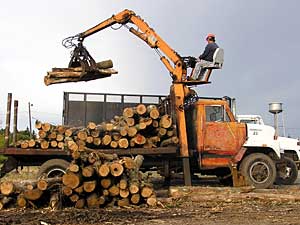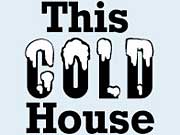 |
| A loader dumps oak firewood into a truck for delivery in the Cloquet area. (MPR Photo/Bob Kelleher) |
Duluth, Minn. — This is Kent Price's busy season, and this year it's a lot busier than usual. His business, Price Firewood Company in Cloquet, has been getting a lot of phone calls.
"Yeah, a lot of new customers out there, looking at their first purchase of a wood stove," Price says. "And a lot of old customers that had quit burning wood when the pricing of fuel and propane and natural gas was down. They're coming back and calling me and restocking their supply."
Price, his son and two other employees, are working long days, splitting and delivering truck loads of seasoned oak firewood for Cloquet area customers. Business is up about a third over last year. It's a kind of panic buying he's seen before.
"One of our busiest times was the first Gulf War," says Price. "We could not keep up with the demand. Now, with the second Gulf War, and ... now the price of fuel, it's very very busy. But it does not seem to be as busy as with the first Gulf War."
People are worried about fuel supplies, but mostly they're worried about the cost. Price says you could heat a typical home, with cut, split and delivered firewood, for maybe $1,000 to $1,200 a year.
While that sounds like a lot of money, it may not be, considering natural gas prices are predicted more than 70 percent higher this winter. Heating oil is expected up about 34 percent.
That makes firewood look pretty good.
"I think it's a great thing," Price says. "It's a renewable resource. When you cut a tree down another one will grow. People in Minnesota, Wisconsin, and Michigan; I think it's a great value." The rush is on at the Fireplace Corner - a Duluth store that specializes in wood and gas stoves and fireplaces. On a weekday afternoon, customers are looking for help, and the phone just keeps ringing. Store Manager Jason May has met many concerned homeowners.
"They're really worried that with the rates natural gas is going at propane's going to go up," May says. "Oil's going to go up. So, they just want to have another alternate way to heat their home or at least supplement it, so they're not getting bit so bad when the gas bill comes."
It's not just wood. May says there's a lot of interest in wood pellet stoves and even stoves that burn corn. And he says modern stoves are far more efficient and far cleaner than their counterparts from just a few years ago.
Unfortunately, a lot of older stoves are still out there. Bob Beresford, air quality specialist with the Minnesota Pollution Control Agency in Duluth, say a return to wood could be a return to the bad old days. Beresford says there's not much the MPCA can do when people complain of a neighbor's wood smoke.
"That would be a concern," says Beresford. "And we really don't have much in the way of regulations at the state level here that would allow us to get at the problem of wood stoves if a problem develops."
Wood smoke carries at least 14 chemicals known to cause cancer. Tiny particles in the smoke can get trapped deep in people's lungs. Beresford says, having a wood burner in the home is like adding a smoker to the family. In some places, wood smoke is a huge problem. Communities from Oregon to Colorado have banned wood burners from new construction.
"Wood stoves are definitely a dirtier source of emissions," Beresford says. "Any solid fuel whether it's coal or wood, is going to have a lot higher emissions than oil, which in turn has a lot higher emissions than natural gas."
The rush to wood has even caused spot shortages. While Kent Price in Cloquet says he can get what he needs from his Minnesota and Wisconsin suppliers; other dealers in Duluth and Northern Wisconsin say it's getting hard to find hardwoods like oak and maple. And what you can find, is getting more expensive.







